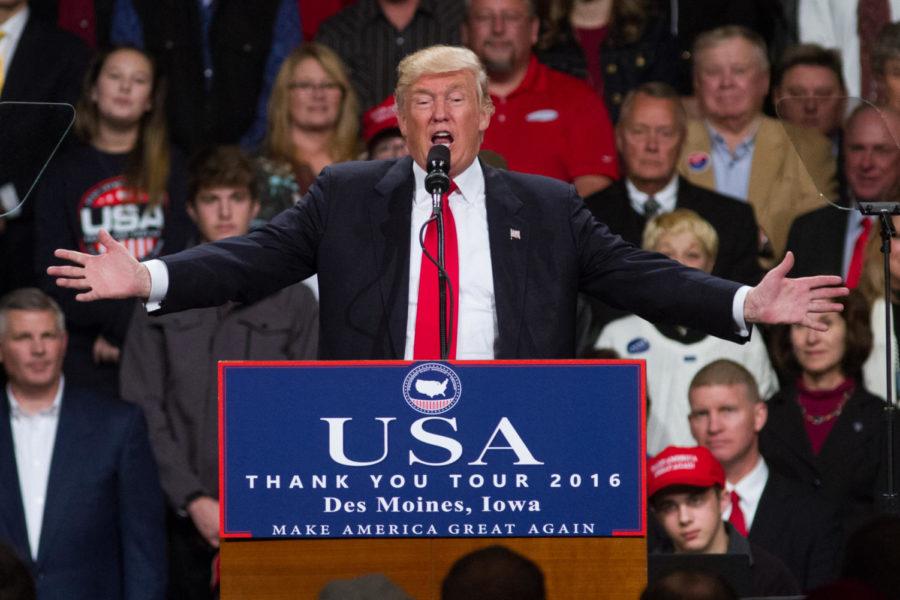Kelly: President Trump is dragging the GOP down
President-elect Donald Trump speaks during a rally as part of his USA Thank You Tour, in Des Moines during the evening of Dec. 8. Trump spoke about the general election, how he would repeal Obamacare, bring jobs back to the US, and reform care for veterans.
March 22, 2018
Recently, Democrat Conor Lamb won the special election in Pennsylvania’s 18th Congressional District — a district Republican President Donald Trump won by 20 points in the 2016 presidential election.
While a 20 point swing in a single Congressional district is noteworthy in and of itself, more remarkable is the overall electoral pattern which has emerged. According to FiveThirtyEight, in the eight special elections held since President Trump took office, “Democratic candidates in federal special elections have now outperformed the normal partisan leans of their state or district by an average of 17 percentage points.”
This electoral trend, along with President Trump’s approval rating and the generic ballot, suggests the GOP will lose their majority in the House come November and will likely lose seats in the Senate as well.
Now, it should be noted the president’s party often loses Congressional seats in midterm elections. But it is undeniable that President Trump’s erratic and ludicrous behavior is toxifying the Republican Party, motivating his opponents to ensure no one who shares his political affiliation is given any governmental authority.
Although it is difficult to determine what, if any, effect a president has on the U.S. economy, a president’s approval rating tends to go up when the economy is doing well, and the stock market has hit several highs during Trump’s presidency. ISIS has nearly been defeated, unemployment has gone down and in December, Trump signed into law a tax bill which will lower most Americans’ taxes. Yet Trump’s approval rating has hovered in the low 40s and sometimes lower for most of his presidency. By contrast, only two of the last twelve presidents have, at any time in the first 400+ days of their presidencies, had approval ratings as low as Trump’s.
The only explanation for Trump’s uncommonly low favorability is that his personality is driving voters to the polls to show him the consequences within a democratic governmental framework of routinely behaving in a reckless and childish manner.
Democrats are determined to #Resist Trump and his agenda no matter what, a stance which is somewhat unreasonable. But on character grounds, they have an air-tight case. Months of taunting the despotic North Korean regime, quarreling with celebrities and television personalities on Twitter, refusing to denounce barbarous dictators such as Vladimir Putin and Recep Tayyip Erdogan and lying routinely has shown that Trump’s personality unquestionably affects his ability to lead the United States. Voters are right to notice this.
Conservative Republicans have expressed disapproval of Trump’s irresponsible behavior and, evidently, even those who are indifferent toward Trump’s behavior or believe it is often justified are unwilling to publicly express support for the president and his agenda by voting for candidates he favors.
Case in point, PA-18. Trump, who holds the support of nearly 90 percent of Republicans, held a rally in Pennsylvania — a state he won in 2016 — in support of Rick Saccone, a relatively mainstream Republican and the GOP candidate in Pennsylvania’s 18th Congressional District; Saccone still lost the special election. Trump boasts of the size and loyalty of his “base,” but it is apparent that the group of his most ardent supporters is not numerous enough to swing elections and is not widespread.
President Trump is likely unbothered by the reality that he is dragging his party down. After all, he has openly attacked Republican politicians, including members of his own administration, and has expressed no remorse for doing so. For the president, one’s loyalty to Trump matters far more than one’s allegiance to a political party.
However, if the president wants to “get things done,” he will have to gain the support of millions of voters, convince some politicians on the other side of the political aisle that he is capable of defending the policies he would prefer to see enacted by coherently explaining the reasoning behind his beliefs and is also willing to compromise on some issues. All of this would require a drastic behavioral shift, the odds of which are extremely low given Trump’s inability to go more than a week without tweeting or saying something inane, erroneous, divisive or some combination of the three.
It is clear Trump’s behavior is politically toxic and has tarnished the public’s view of anyone who shares the president’s political affiliation. If Republicans do not distance themselves from Trump and seriously consider denying him the 2020 GOP nomination, Democrats will control the levers of governmental power in less than two years time.
















